 Rashad's dog, Chloe/Alison R. Rashad's dog, Chloe/Alison R. Was my impetuous act one of generosity or of madness? I agreed to keep Rashad’s dog, Chloe, for the month of July while he was in Europe. It’s not as if the dog and I were well acquainted. In fact, the night I met Chloe is the night I agreed to take her. Perhaps it was the way we met that prompted the impetuous yes to Rashad’s query about caring for the dog. As my friend and I came into his house, this little dog bounded across the room into my arms, clearly preferring me to any other dinner guest. She had me at hello.
So it is with a certain bemused curiosity that I look at my decision-making process if impulse can be called a process. I am finding that bemused curiosity also helps me balance the other feelings that come up in the process of caring for a small leaping creature in a condo with no yard. I feel hyper-responsible, if there is such a condition, certainly less free to come and go. Very much like a parent.
Although we are in the first week of this month-long adventure, it is certainly with bemused curiosity that I note how quickly the dog has figured out our routine for taking her on her necessary forays into the neighborhood. She knows that going downstairs means we take the stairs. She always turns left immediately outside the building and from there explores the world according to trails of smells left by other dogs. Back from the walk, she knows to head for the elevator. It’s not a long ride from the lobby to the second floor, but it is enough time for Chloe to position herself for an adroit leap out just as the elevator doors open. I couldn’t say how other dogs get on or off elevators, but that Chloe figured it out so quickly impresses me.
Without access to an enclosed yard, Chloe has to be in a harness she doesn’t like if we are to go on our multiple strolls through the dried up grasses of neglected lawns on McAllister, Laguna and Golden Gate. She cowers when I put on my black coat because she knows we are going out and this will mean a harness and leash. She can’t be trusted to obey traffic signals or second-guess the speeding cars on Gough. When Chloe is home with Rashad, she can always go downstairs through a doggy door into a yard. Safety is not an issue.
Rashad had told me his dog doesn’t bark, so it was with bemused curiosity that I heard her growls turn to full throated yaps when she saw shadows from blowing trees. I will have something to tell Rashad when he gets back.
Clearly, in the month of July, Chloe and I will be partners on “the path.” I have been searching out web sites that purport to teach dogs to meditate. So far the suggestion I like best is the one that must be intended for owners of small dogs because the instructions say to lay the dog on the owner’s chest and synchronize the dog’s heart beats to one’s own. Maybe this will happen spontaneously. When I lay Chloe on my chest, I feel incredibly peaceful but then need to use a clothes brush.
It is certainly with bemused curiosity that I observe Chloe’s decorum while I am in my morning meditation. She doesn’t leap on me or bound around the room in a high-energy mode, but lies at the foot of the bed on the cushion I have put out for her. Being with Chloe always produces a Zen state if Zen state means being in the moment.
As well as a practice in being present, a dog is serious business, so it is with even more bemused curiosity that I observe the annoyed, pleasurable, and burdensome emotions that arise since I assumed responsibility for another’s being, in this case Rashad’s dog Chloe. And we are only going into week two.
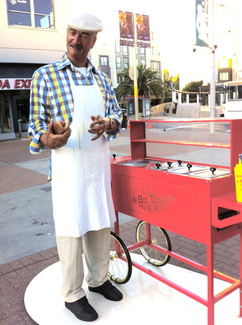 Relish Too? / Alison R. Relish Too? / Alison R. They appeared overnight. Trucks must have driven them to the neighborhood; city workers then set them down randomly or by plan in the Fillmore Plaza, near the park at Steiner and O’Farrell, and in front of the post office. They are different ages and each has a preoccupation or occupation. My friend Abe called them “dummies.” Willis said they were made of bronze or tin. After I clanged on the hot dog vendor in the plaza, I agreed with him.
Seward Johnson’s sculptures “Celebrating the Familiar,” which appeared suddenly at Fillmore and O’Farrell, surprised me. The day before they hadn’t been there and then there they were: mariachis strumming their guitars; a woman reading to her child; a man grilling hot dogs; a soldier holding the flag, just home from war, being hugged around the knees by his daughter.
The pieces are entirely bronze. The Seward Johnson website says that the skin on the pieces is a traditional bronze patina, and the opaque colors come from the type of paints used on airplanes. The figures are resistant to climate conditions. Each is coated with a thin film of incrylac and a final coating of wax. Johnson’s “people” also live in New York, Osaka, Houston, Washington DC, Chicago, Dallas, Los Angeles, Paris and even Istanbul.
I delighted in the suddenness of their appearance in my world, in their ordinary human pursuits. To me, they looked like what people mean when they talk nostalgically about simpler times. They certainly brought to mind the notion of “American values” old style.
Not long after these figures showed up, the Supreme Court, wittingly or not, began undoing the familiar past and expanding the legal definition of marriage, to include what we in San Francisco find somewhat commonplace – love between same-sex couples. Someday when statues that celebrate the familiar appear in the public square to represent American values, wedding rings will be prominently depicted in gold or silver as men embrace men and women embrace women. Married men will push their bronze buggies holding their smiling bronzed babies and women married to women will watch their sons or daughters play stickball or kick soccer balls. And people passing these sculptures in public places will smile, perhaps remembering the excitement of those bygone days. Recalling what it felt like to be present for the momentous legal shift in this country. And if such sculptures appear in this city, some will recall that same-sex marriages resumed a day or two before the annual Pride Parade, an event that drew millions of cheering Americans to this city in celebration.
Kate Kendall, Executive Director of The National Council for Lesbian Rights celebrated the Supreme Court decision with a reminder that in many places relationships and families of same-sex couples are not respected.
“There will still be many places in this country where stigma, lack of dignity, hostility, and harassment are daily realities. But … those who are bigots, haters, ignorant, or cruel—their days of having power over us are numbered … those who would deny our humanity are outnumbered by those who embrace us.”
So I could almost wish that someday a bronzed Fox News pundit could be seated for eternity at his bronzed news desk, smug and wrong. Passersby could shake their heads, remembering that once there were people who disseminated fear and ignorance and pretended it was information. Those who stop to smile may recall how love and marriage won over fear and ignorance.
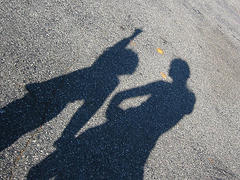 Shadows / dvs At the start of the week as the sun rose, I joined a mother and her two small children dancing with their shadows in the Safeway parking lot near Fillmore Center. We swayed and gestured at our dark doubles. In my jacket with wide sleeves, arms outstretched, my shadow looked like a bat. The dancing daughter said she was a fruit bat, the son, a blue water bat and the mom said she was an elephant bat. When we ended our dance, we bowed to our shadows and to each other. Then I drove home, imagining them dancing across the plaza and up Fillmore Street.
As dance partners, shadows can be great fun. Yet my relationship with my shadow has often been dark. May I remember this recent brief and lovely relationship with my shadow as I continue to face C.G. Jung’s archetypal “Shadow,” the part of me that represents all my disowned, despised, and repressed traits. Buried in the subconscious mind safe from judgments, my shadow is grounded in fear and plays out in drama and competitiveness. Sometimes it casts its darkness over other people, projecting traits that are more about me than about them. Each time I approach my shadow with curiosity and acceptance, my reactions soften, allowing me to be less heavy handed.
And now that Corky and I are again in relationship, protecting us is high on my list of priorities. And I agree with her that it is in our best interests for me not to get so angry when my feelings get hurt that I lob an empty plastic water bottle at her the way I did in the parking lot when we went to Ashland several years ago. We’re going there in June, so it makes sense that she would remind me of that episode. Part of protecting us will be recognizing when I am dealing with my shadow projection rather than with the real Corky, who, like me, just wants to be happy.
This time in our relationship I want to see and appreciate her without reading in or acting out when I am scared or intensely emotional or getting my competitive feelings stirred up. I’m guessing my shadow is in play, and this is where I can look for clues into that unskillful behavior.
Jung says the higher purpose of the shadow is to help us transform into our fullest being. He calls it “our sparring partner,” the opponent who exposes our flaws and sharpens our skills.
I know it takes a lot of honesty to face traits in myself I hate and can’t help but notice in others. I have to acknowledge they exist in me. Actually, over the two years that Corky and I were apart, Buddhism, meditation and therapy have made me more familiar with parts of my psyche that were damaged or hadn’t matured. I have learned that shame shows me where to look. I am more familiar with the strategies that keep me from feeling pain from my disowned parts. I want to continue to accept my shadow and the fear and rejection it holds, so they won’t need to be acted out so dramatically.
Like with the shadow in the parking lot, light shining on one side reveals the dark side, allowing for the dance. As for Corky and me, I hope we both learn to express our true feelings, and we make it safe to see our shadows, to forgive ourselves and each other, and to learn to accept, again and again and again.
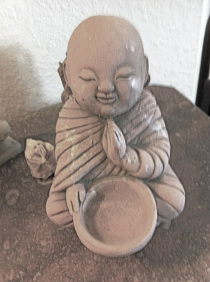 Baby Buddha Statue / AlisonR. I went to the home of strangers to rock a five-week old very big baby boy. I signed on to a list of baby soothers, friends and church members who could assist with the family’s newborn son a few hours each day. Because of a broken arm, the baby’s mother can’t hold him; the baby is bigger than a one-armed mother can manage. Although daddy is on paternity leave and helps, he can’t hold the baby continuously. I don’t know why I volunteered.
I hadn’t seen myself as a baby holder, yet here I was. Sometimes experiences just come along at the right time. I had heard from my meditation teacher and others that I should hold my own experiences with gentleness. Yet somehow, this had remained a concept rather than a physical reality. This week something settled in me as I gathered up the sobbing baby.
Perhaps it was into the second day of rocking the sleeping baby in the glider that I ran out of nursery rhymes. Undaunted, I sang an aria from Tale of the Missing Sock, an original opera for soprano voice inspired by one bare foot. When the baby’s mother tiptoed into the room with a glass of water, she caught the closing notes of my lament for the missing sock, a tune crooned in the soprano voice I crafted while living in Japan, where a high voice connoted a sweet and gentle woman.
Apparently, during the quiet time my gentle rocking provided, mom had been catching up on her work. For the time I was able to give her, she was exceptionally grateful. And I was grateful too. Who would have guessed how much bliss I would find cradling, rocking, singing and holding stillness for this large, sleeping baby boy.
Sunday afternoon was my third go at holding the baby, so daddy could drive the real grandmother to a friend’s house across the city and mom could sleep an hour.
Hard to believe that only three days before, I beheld a sobbing, seemingly inconsolable baby I had never seen. Nobody told me that holding this baby, his face on my shoulder, his breath sweet, his dreams sounding from his throat against my cheek could sink so deeply into my being. Yet this was what happened. Hours passed as I sang, rocked, patted and ran my hand up and down his back, occasionally adjusting his head when it lolled too far on my shoulder.
Sadness came. I had given birth to three of my own screaming, hungry sons, none of whom I could recall having held with this much patience and gentleness. My babies had not had a mother able or with time to be gentle, to give herself totally to holding, soothing and singing arias about missing socks.
Yet being with this baby is more about gladness and gratitude than about sadness and regret. My sons grew up to nurture children or pets of their own. And here I am unexpectedly with a chance to nurture myself, to experience the gentleness called up in my heart by a child of strangers. I see how I can cuddle and rock my own inner life with the same care as I cradle this baby boy.
 Kitchen Story from Yelp / Genevieve Y My girlfriend Corky and I like to have breakfast together in lovely spaces on days we will not spend together because our commitments keep us apart. We go out early. That is our habit because we choose popular places that fill up quickly. This particular morning, however, the restaurant was almost empty. Seated with my back to the window, I could see most of the small space.
I call this “The Kitchen Story” because that’s where we were that morning. It started as a story about a simple kindness. It has become a struggle to tell without it becoming bigger than it was.
Here is the story. Not long after we were seated and studying the menu, a man came in. He was unkempt and carried a large green bundle that could have been a sleeping bag. It was obvious that the two young women on the wait staff did not want to seat him, and they did not know how to ask him to leave. They skittered around the counter uncertainly and finally seated him in a corner.
I could see their discomfort; I gestured to one young lady and when she came to the table, she acknowledged that the man’s demeanor made them uncomfortable. Neither of them knew what to do about him. She said that if he did not pay, the manager would be angry and they would have to explain. In short, they were uncertain and unprepared to deal with the “what if.”
Without thinking, I said to her that I would like her to serve the man, and I would pay for his breakfast if he did not. I had to reassure her multiple times that I truly meant to do this. They were relieved by the offer. The man was served his breakfast and he paid his bill. He also left a tip.
Why was telling this story a struggle? Did I have problems with appearing kind and generous? Both traits are admirable. Hoping she could help me tell the story, Corky shared it with her friends. Their reactions made it appear even bigger than it was. While it’s gratifying to be in the same sentence as Gandhi or the Dalai Lama, it only added to my discomfort.
In truth, at that moment I had no large vision, not even the first Unitarian Universalist principle: The inherent worth and dignity of every person. I did not think to tell the uncertain young wait staff to look past that man’s unkempt appearance and behold his inner goodness. Nor did it occur to me that I might postulate the Buddhist precept of not causing harm.
It was even later as I wondered about telling the story at all that I remembered sobbing through Olivier Messiaen’s opera, Saint François d'Assise. When the monks are busy with monastery chores, an angel asks admission. They wave off the angel without seeing him. When I considered this all too human mistake, I cried.
As I have grappled with telling this story, I see that the struggle has been in writing about myself when experiencing no self was such a large part of it. This state of being is certainly unfamiliar. And that is my kitchen story.
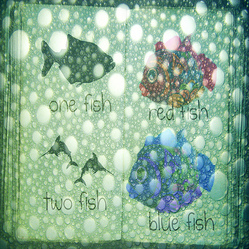 Dr. Seuss Fell in the Aquarium/Garland Cannon I really needed to practice self-compassion after having spent Friday through Sunday with my five-year-old granddaughter whose first words to me were “You’re not my real grammy. “My real grammy lives in Colorado.”
Could failing to be the "real grammy" put me at a disadvantage with my little cherub? Not being a “real grammy” might mean that rules for getting along and going along wouldn’t apply to me. This little girl and her Grandma Alzie might need to fashion our own rules—in a hurry and quietly.
Working things out with little or no disturbance were explicit parts of my responsibility on this visit. My son had asked me to come to Los Osos to watch our beloved girl so he could sleep, and Miss E’s regular sitter, Tracy, could take a much-needed break. Everyone is exhausted because daddy has been temporarily working a night shift and though it is winding down and he will be back to full time parenting, he still has a few days to go.
I discovered right away that a child makes rules for the benefit of the child. The child wants what the child wants. Child rules can be as simple as keeping the ace of diamonds lost fairly according to the rules of the card game “Roar.” A child can refuse to budge from the computer when grandma says three hours of animated games in Daddy’s room is enough.
Daddy would hope grammy would be the rule maker and enforcer, that she would take charge of the child swiftly and silently, relocating her, preferably downstairs. Dragging her off the chair kicking and screaming is not an adult option. Luckily, Daddy’s need to sleep will soon be over. He is, after all, the authority figure who issues time outs and puts the iPad out of reach.
Sadly, on this visit I did not have the clout to convince the child to follow my rules without an argument. More than once, daddy did have to wake up, get up, and assert his authority.
Finally, when it was Sunday afternoon and I was ready to head back to San Francisco, I gave in to a sprinkle of self-pitying tears and a few rips of self-criticism. Why had my sweet little girl not said goodbye to me as I bustled my belongings out the door? Had my inability to enforce rules made me a grammy failure? Would the Colorado grammy have done a better job? Would she have made better breakfasts? My little charge had eaten eggs I fried and the toast with the butter and jam. She had not found fault with the microwave popcorn we munched as we watched Toy Story 2 twice and El Dorado once. Not to compare myself to the Colorado grammy, but I did wonder if on her visits she plays multiple games of Roar? Would she have slept in the bed with the little girl and her stuffed toys? Would she have read the requisite two books at bedtime and listened to the child read One Fish, Two Fish, Red Fish, Blue Fish?
Exhausted from the drive home, I went to bed, confused and disappointed that my visit had not made life easier for this dear son and his little girl. The next morning I turned for perspective to my friend, Kate. She pointed out that both my son and I had expectations about the outcome of the visit. And this hadn’t proved skillful. On the way home from Kate’s I listened to a self-compassion podcast. That helped. With self-compassion warming me, I thanked my inner critic for trying to steer me into being the best grammy I could be, suggesting to her that less harsh rhetoric would still be effective.
Now I am rethinking my role, seeing myself a rule-making, boundary setting grammy. A lot like the Colorado grammy. At about the time I am feeling at peace, my exhausted son calls to be sure I have made it safely back to San Francisco. He suggests that for smoother future forays, he will “franchise my visits.” I imagine from now on each visit will have a set agenda with designated spots in and about the estuary, park, school grounds and beach where I will be permitted to go on foot. There will be a list of equipment for the child such as helmets, bikes, scooters, skateboards from which I will choose, depending on the terrain of the spot to which we are headed. I am not nor will not be allowed to drive the child anywhere.
“Franchising visits” makes me laugh. I appreciate his effort and don’t bother telling him I had already planned to be a more consistent grammy who sets clear boundaries. As for him, it is too late to redo my parenting.
 Snow in Southbury, CT / AlisonR. It was the week of Christmas and I was in Southbury, Connecticut. The temperature kept dropping; it snowed. My son and daughter-in-law didn’t want to drive the icy highways to show me historic landmarks. They were glad to stay in the house with the fireplace and the warmth.
Besides, going anywhere would have required us to plan our time around the needs of Otto, my son’s aging pitbull. For one thing, the dog needs help getting up and down stairs and if Otto doesn’t have his walks, he whimpers during the night.
I went to Connecticut to be with my oldest son and his new family. Naturally, I wanted all of us to spend time in meaningful conversation. And we did, but we could have just so many conversations.
Without a car, or any place I really wanted to go alone, I was limited to the living room, or the room with the big bed in it. I did spend time in the kitchen Christmas day when the cooking was going on. I assigned myself to stripping herbs from their twigs in the amounts called for in the recipe my son was using to prepare Christmas dinner. I liked doing that.
All in all despite the pleasure of talking with this family, and the beauty of the snow, I got in touch with flurries of my own unease. From experience I knew how scared I feel away from my customary diversions. I worried about how I would fill time cut off from my usual time fillers. I was aware that many of these are meant to divert me from the discomfort of feeling groundless.
As I prepared for this trip, I promised myself that I would practice living with moments of uncertainty and groundlessness. To help me, I downloaded Pema Chodron’s Living Beautifully with Uncertainty and Chance. I committed to experiencing any unease I might feel away from my diversions.
It isn’t only travel that brings up discomfort. Even in familiar surroundings, I fight what feels like a loss of ego. Of course, in my own territory with a car, I can escape to the supermarket or to the nearby Starbucks. I can play computer games or visit the refrigerator.
According to Pema, I was in the midst of what she calls “fundamental uncertainty.” She says people don’t want the uneasy discomfort of feeling groundless in any form. Addiction, overeating, television, any excess is a way of avoiding the pain of feeling unsubstantiated and foundationless.
I had mixed results living with my uncertainty during my visit to Connecticut. Despite my resolve to be with my feelings of groundlessness, I did escape into 21 episodes of Friday Night Lights on Netflix. On the other hand, although a day of baking had left the kitchen table laden with freshly baked cookies and breads, I did a good job of avoiding the sweets no matter how restless I felt. When I sat at the table to meditate, my son asked me if I was praying to the god of baked goods.
My hope was to sit with my restless energy and underlying uneasiness and not seek distractions and diversions. I wanted to experience some of the unpleasant aspects of being me those diversions have helped me avoid. The trip to Connecticut was a good first go at being open to the less comfortable parts of myself.
So, bless the snowplows which scrape their way through town before dawn and clear the dark roadways winding through the white landscape. Bless my feelings of uncertainty, boredom, and discomfort. And bless my son and his new family, who opened their home to me for Christmas.
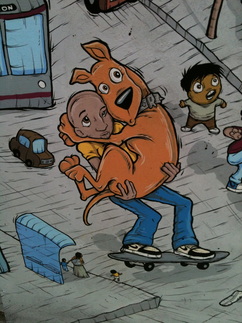 Part of a mural at Balmy Alley / AlisonR. I’m surprised Ehipassiko, a Pali word from the Sanskrit phrase ehi, paśya “come see,” isn’t spoken more often. From Buddhism, it means to see for yourself, to not believe the Buddha’s teachings without trying them out for yourself.
Ehipassiko in my own life does not just apply to Buddhist teachings but is an invitation to see everything freshly, to be curious and open to life without expectation or needing things to be a certain way. Ehipassiko reminds me to trust my own experience. And it goes without saying that experiences change, so each new moment allows for fresh curiosity. What is now? How is this new?
I took that invitation on November 2nd, when I chose to celebrate Día de los Muertos by revisiting a place I had been once before under quite different circumstances. My once-girl friend, Corky, invited me to go with her to Balmy Alley to look at murals.
The two of us, faces whitened, eyes blackened, tips of the nose black so our faces resembled skeletons, took the 48 Quintara to the Inner Mission to walk along the street lined with murals celebrating Central America and Latino/a culture. Looking fashionably dead with flowers in our hair, Corky and I revisited this site, which had been one of the first places we went when we began to see each other as possible romantic partners. On our first visit to Balmy Alley I saw less of the murals and more of the possibilities I imagined, focused as I was on my expectations of a possible relationship.
This time in Balmy Alley as we waited for a new mural to be unveiled, I appreciated the humor and art inspired by a culture well-represented in this city. One of the artists who had contributed to the mural pointed out to us that she was the one who had painted the purple roses along the side of the mural. She said she paints roses partly because she is Patricia Rose. At the end of the alley one painting is filled with roses, and we knew she had painted it. Having met her, it mattered more than before.
Ehipassiko! I am standing in the bathroom at Corky’s house half an hour before we are to go, and I am slathering on white face paint and then I am applying black to my eyes and the tip of my nose. I make a scar on my cheek and neck. I am acting as if it is the most natural thing in the world to look silly when in fact it has been one of my fears to appear a fool. In the past, I have avoided dressing up for Halloween although once I wore green and brown and put twigs in my hair to trick or treat as a tree. But I am risking discomfort to go along with Corky who is comfortable in costumes. Indeed, she is more attractive dead than I am. But I am okay with that, it’s an experience I can enjoy. On the crowded bus ride, we drew wide-eyed stares from children as well as appreciative smiles from Latinas going to the Mission. Ehipassiko. Venga y vea. Dos viejos las mujeres celebrando el día de los muertos!
Ehipassiko! Come and see this movie with me, grandma. My granddaughter, who has just turned five, wants me to watch “Tangled” again. She saw it once over breakfast. We watched it the night before. Now we are back from the store and she wants to see it again if Daddy will say yes. In one day she would watch a movie starring a princess or mermaid in purple and pink five or six times and not be bored or think it strange. Each time the familiar film is a fresh experience. Each time she points out something new. Take her word for it!
Is it excessive to apply Ehipassiko to everyday life? Wouldn’t “Hey look at this” work as well? Or “Take a look!” I like Ehipassiko because it reminds me of Buddhism and the need to embrace the current moment. It is my delight as well as hard work to seek the holy in the daily and to look for meaning in the menial. Looking with reverence at the ordinary enhances my life.
 baseball cap / starlord The outcome is clear. Tigers swept in four games. Giants victorious. And though nobody asked me, I am certain I saw the gods intervene in game one of the World Series when the redoubtable Justin Verlander, beloved of pundits and Detroit fans, whose pitching was the best, so everyone said, faced Your San Francisco Giants. Their game was once described by pundits as “torture” because fans suffered so. You may not see it, but I see a parallel with the Trojan War. Thus did the goddess Athena disguise herself to lure Hector out of Troy to do battle with Achilles, who causes Hector’s inevitable death. And likewise, the gods tease the Tigers into thinking they can prevail, that it's a level playing field. And then the gods, for their own entertainment, begin siding, sliding and abiding with our home team. How else account for a ball hitting third base to the bafflement of the Tigers, whose minds seemed momentarily clouded. How else does Pablo “Panda” Sandoval smack the ball over the wall three times against a pitcher who sneers when his coach comes out to the pitcher’s mound to check on him? He’s that good so it’s an insult. Only the gods could make a clutch hitter out of Barry Zito, the pitcher. Pitchers don’t have to hit the ball. Everyone knows that. I stopped watching that first game before the final score was 8-3 because I had decided to go to a dharma talk and intended to walk to the Zen Center on Laguna at Page. Again along the way I saw the gods at play; how else explain camaraderie instead of the usual dark night wariness? Down Gough and up Hayes, people laughed and chatted good-naturedly. I doubt anyone would ask a stranger, “Hey, why are you talking to me? Do I know you?” Being filled with and surrounded by good will and aware that the gods have intervened, I feel as if I carry close to my heart a miraculous ball of light, and I want to show it to anyone willing to share it. When a man pushing a shopping cart passes, I dazzle him thusly: “We are winning six to nothing and Pablo Sandoval hit three home runs.” I can see he is happy at the good news. We exchange smiles, and I continue along Laguna. At the Zen Center, as one might expect, it’s mostly silent. I don’t see anyone checking a mobile device. I have left mine at home. Adding my red leather sandals to the shoes outside the door of the room where Rev. Keiryu Lien Shutt will give the dharma talk, I settle on a padded bench along the side of the room. Once Reverend Shutt performs the rituals that precede a dharma talk, and adjusts the hem of her robe to cover her feet, and thanks her teacher and the one who invited her to speak, she asks us the score of Game One. Baseball is not a religion and the Greek gods long ago emptied their closets on Mount Olympus and no longer visit woods, groves or kitchens, but some gods seem to hover over the SF Giants. They cause community wherever folks pass each other or gather – at the opera, in bars, restaurants, on dimly lit sidewalks or on BART where fans periodically yell out the score. One such community of Giant fans settled in Section 140 at the ballpark is like a family, and reporter Mike Kepka writes of them in the Oct. 28 San Francisco Chronicle in an article called “Love in left field.” He writes, “In this story the regulars in Section 140 are the Giants. They represent everything that is great about baseball and a city that loves its team.” Following the Giants’ sweep of the Tigers in ten innings at rainy, cold Comerica Park in Detroit, Giant General Manager Bruce Bochy praised the team for playing unselfishly. It was a collective win!! Nobody asked but I believe the gods are smirking as they stroll among the thousands and thousands of fans celebrating in Civic Center and throughout the city. And there’s an occasional very high five.
 Whole Wheat a la Tassajara / Editor B On Wednesday I experienced a “shifting-into-place,” an awareness that I was quite fine as I was despite being no different than I had been before coming to this conclusion. Buddhist teacher Tara Brach wrote about “shifting-into-place,” in a blog when she described Zen teacher Ed Brown’s realization in his early years at Tassajara Zen Mountain Center that his biscuits were fine just as he was baking them. For years, he had been discouraged because, to him, those biscuits didn’t taste like the Pillsbury biscuits he’d “made” many years ago. I think of all the years I have coped with the belief that I was not-good-enough, not in regard to biscuits because I don’t bake, but in regard to my essential self. On Wednesday, despite having the same history, scars, propensity for pettiness, and limitations, I suddenly didn’t see myself as a problem in need of fixing. This shift doesn’t alter my intention to continue my weekly time with therapist, Jennifer. Neither do I plan to stop sitting meditation or to cease classes at the East Bay Meditation Center. And I will continue sharing not always attractive personal truths, although the motivation may no longer be to compensate for “not being enough.” I still want to be heard and more than ever I want to hear others tell their truths. On Wednesday, I accepted just this: being as I am. At that moment, I felt myself at rest in reality. I was just as I was without further judgment of who or how I should be. From this shifted perspective, I now want my efforts to seek inner peace to be in service of all beings, to cause no harm. We are, after all, interconnected. Are we not? I can’t say exactly why on Wednesday something shifted. Perhaps it was tied to the four-week course on Buddhist precepts that ended the night before. I had been profoundly moved by learning what it would be like to live the precepts day-to-day, how tightly tied was my behavior to the well-being of all the people with whom I would come in contact and whom they would someday meet. Yet appreciating the precepts didn’t happen the first day I saw them written on flip chart paper and taped up at the East Bay Meditation Center. The teacher, Mushim Ikeda, had drawn a line down the center of the paper and introduced “Five Precepts in Simple Form” from the dual perspective of what one is not to do on the left side and what living them entails on the right side. 1. Not to kill but to cherish all life. 2. Not to lie but to tell the truth. 3. Not to steal but to respect the things of others. 4. Not to commit sexual misconduct but to respect the wholeness of relationship. 5. Not to misuse or deal in intoxicants but to practice clarity of mind. Sort of do’s and don’ts if one were to see them as prescriptive like the Ten Commandments. But that is not, Mushim told us, the Buddhist way to work with precepts. I have to admit at first glance I was dismissive. Four weeks studying these? I thought what a waste of time. I was wrong to underestimate the value of thinking about how to live. Consider the first precept: Cherish Life. This precept means cherishing one’s own, not just the life of a water buffalo or a dairy cow, a stray spider on the shower curtain or the ant infestation on a hot day. How do I actually live by this precept day after day? I thought of a time in the recent past when I did not cherish my life enough to tell someone clearly and simply, “This is not working for me.” That failure to speak up for myself resulted in hurt feelings and rancor I know did not add to the good of all beings. Buddhist teacher Diane Eshin Rizzetto explores the precepts in her book Waking Up to What You Do. She reminds me that I will not suddenly rise to every occasion just by memorizing the precepts. Living with these aspirations needs an ongoing, active engagement with everyday choices. In the smallest moments I can apply the precepts by asking: “How do you choose to live your life?” Ultimately, I find the precepts to be so profound that I vow to begin again and again, not to be deterred by my failures to apply them skillfully. Perhaps with practice, I can use the precepts to cause no harm. And should I cause harm unwittingly, I can intend to do better next time.
|
 Rashad's dog, Chloe/Alison R.
Rashad's dog, Chloe/Alison R. 








 RSS Feed
RSS Feed